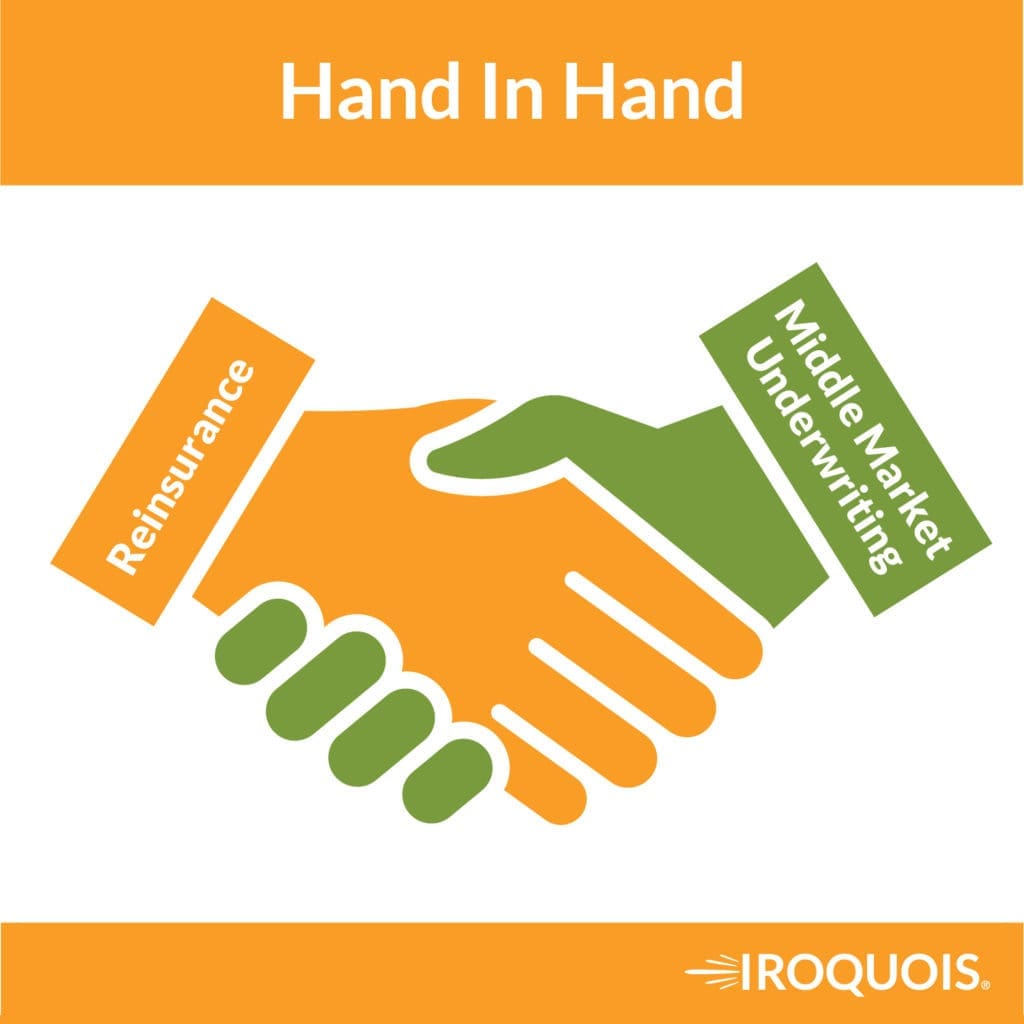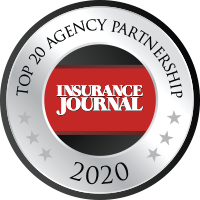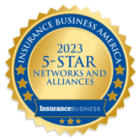Charlie Venus is joined by CNA’s Senior VP and COO of Middle Market and by their Senior VP of Customer Segments as they continue their two-part conversation. Last week, we discussed how CNA defines and manages Middle Market business. As well as how the Middle Market has been affected by the pandemic. In part 2 this week, we learn about the critical role reinsurance plays in underwriting decisions. Lastly we learn how COVID-19 has impacted the reinsurance market.
Edwin K. Morris (3s):
Welcome to the trusted advisor podcast brought to you by Iroquois group. Iroquois is your trusted advisor in all things insurance. This week, you’re listening to Charlie’s corner, a segment hosted by our very own Charlie Venus.
Charlie Venus (18s):
We’re back with Julie and Dieter from CNA to discuss the current reinsurance marketplace and to learn in detail about CNA’s middle market appetite. Julie, before, you mentioned re-insurance and just to touch on that, you know, people know about re-insurance and they hear the word, but they really don’t understand. Or a lot of people don’t understand how re-insurance impacts your underwriting decisions and your pricing. Could you just quickly touch on that on the current state of re insurance market?
Julie Stephenson (48s):
Absolutely, and yeah, I’ll start by saying that we must react to what’s happening in the reinsurance community because you know, the vast majority of our portfolios across the commercial marketplace, whether it’s CNA or, or our competition, and we purchase treaty reinsurance to reduce the volatility in our portfolios. And so those treaty reinsurance costs certainly are costs that we must absorb and you know, how we in turn, pass those costs onto to our customers. You know, we were already seeing a tightening of terms and conditions and costs on both the treaty and backside even before the current pandemic.
Julie Stephenson (1m 32s):
So with the effects of the pandemic now weighing heavy on the re-insurance industry, there’s going to be change. You know, all the treaty renewals, at least on the property side that, that we have heard about, you know, certainly through our broker partners and our re-insurance brokers that we work with, the vast majority of those treaty renewals are taking pandemic exclusions and significant cost increases. And so, you know, given, given the economics of our business, that certainly does impact pricing on individual risks, that that treaty portion is a big player, but there’s also what’s happening in the facultative side of the market.
Julie Stephenson (2m 13s):
So Dieter, do you want to talk a little bit about the fact side?
Dieter Korte (2m 16s):
So the facultative market is really where all underwriters interact almost on a daily basis with our reinsurance partners. And there have been some trends that have really firmed up over the past year plus. I would say, first of all, again, just to provide you some background, we typically only purchase facultative re-insurance on the property side, as well as automobile, and then we’re warranted into the excess lines. So we are not a purchase of facultative for general liability or for workers’ compensation. But having said that on the property side, the reinsurers are starting to avoid low attachment points where maybe a year, year and a half ago, we were able to secure capacity at low attachment points.
Dieter Korte (3m 8s):
And what I mean by that is attachment points below 5 million per risk, that is getting increasingly difficult, you know, typically anything below two and a half million dollar attachment points, it’s very different to find a reinsurance market. I would say on the automobile side, specifically the reinsurance has had to ask a lot more questions than they historically have and, you know, for your audience, it, it’s probably good to understand that dynamic, especially in the non owned and hired exposures, you know, we are increasingly needing to provide very accurate head counts, how many people use personal vehicles on company business, the exact spend on rental, you know, rental reimbursements, you know, what underlying insurance limits are required for the use of personal vehicles.
Dieter Korte (4m 3s):
So this will obviously make its way into us as a primary market. So it’s good to start gathering that information. It certainly speeds up our ability to respond and the reinsurance markets ability to, to respond. And that does make its way into the umbrella line ultimately too. And it’s, it’s really important to point that out for the bigger white collar risk, like, you know, big professional services companies, technology, businesses that don’t have a fleet, but they do have an extensive use of personal vehicles or use of rental vehicles.
Charlie Venus (4m 40s):
Oh, that was great. Now, what I want to do for the, for the remainder of the podcast is give both of you the opportunity to, to talk about why agents should be going to CNA for their middle market needs and what industries you want to focus on. And, and you can give a quick definition of whether your middle market definition is exposure driven or premium driven.
Julie Stephenson (5m 4s):
Yeah, I’ll start off with just how we view middle market on the whole. Then I’ll hand it off to Dieter to go into each of the industries and our appetite and value proposition. So I think I mentioned at the beginning of the call that we took that important step of carving construction out. Construction is our largest industry vertical, and the brand is very strong. And now under the very fine leadership of Song Kim, but what this did is allowed Dieter and I to specialize solely on middle market with middle market dedicated underwriters. So in the past, our underwriters may have been 50% construction and 50% all other industries, which is, it’s a lot, right? If we want them to be specialists, we want them to have that deep industry expertise that, that you would expect of a specialist.
Julie Stephenson (5m 50s):
They were simply spread too thin. So now this middle market dedicated underwriters can really dive deep on the industries where we want to grow. We also decided not to specifically define middle market in maybe a traditional way. So we looked at revenue thresholds, we looked at premium thresholds, and at the end of the day, we decided it really didn’t matter. What mattered to us was your perspective. If you consider a client to be a middle-market client, perhaps they’re seeking multiple lines of coverage from a single carrier, they don’t have a risk manager. They’re relying on you to fill that role, you know, and you consider that to be a middle market client. We will follow suit and we’ll have a full suite of capabilities, which Dieter will get into, to serve that client.
Julie Stephenson (6m 36s):
So you don’t have to worry about keeping up with, you know, whatever our latest premium or revenue or payroll threshold is for middle market. And then finally, you know, once we got those dedicated middle market underwriters, you know, under our wing, we really focused on two areas, one developing multi-industry expertise for our underwriters, so that they can be truly opportunistic across a wide array of industries and exposures, even beyond, you know, the ones that Dieter’s going to walk you through, we want them to be entrepreneurial. We want them to be solution-oriented. And then the second piece of that was, you know, how do we further hone our single industry expertise in those areas where the marketplace dictates that level of specialization, that would be places like technology, life sciences or FI.
Julie Stephenson (7m 24s):
So we have underwriters specifically dedicated to those industries. So with that Dieter I’ll, I’ll pause and let you go into each of the areas.
Dieter Korte (7m 34s):
Thank you, Julie. I think before I talk about specific industries, I do like to point out that we also certainly seek individual opportunities that may not fall cleanly into any of these buckets that I’ll be laying out for you. So, you know, there could be geographic nuances or unique opportunities that don’t exist across the country and our underwriters and our field operations are well equipped to seek those out together with you and explore them. And, you know, we certainly provide assistance in researching those. So I don’t want this to come across as, a, limiting, but it is certainly pointing out where we already have expertise, experience and dedication to these, to these larger industry groupings.
Dieter Korte (8m 27s):
So let me start off by listing our single largest. And that would be the manufacturing book. So manufacturing book is a little bit more than a quarter of our total middle market writings. You know, I joined CNA to start the manufacturing segment, and I could probably add another hour to this, to this conversation just to get into the depth of our manufacturing book, but in a short way, it is, very much focused around our ability to underwrite individual product liability exposures, understand the risk, understand the controls, their place in the supply chain.
Dieter Korte (9m 9s):
And with that, we’ve been able to expand into industrial machinery and their components, into the automotive industry and the motor vehicle component suppliers. So our whole focus is far more in what some people call the advanced manufacturing industries, where, you know, where we view the future of manufacturing in this country to be. Our next largest would be technology. And our technology book is sort of what you would expect from a traditional technology definition. So it’s very heavy on software developers, consultants, data processing, but we also have a good amount of tech manufacturing.
Dieter Korte (9m 50s):
A lot of that is computer equipment and peripherals. The next largest group, and I would kind of maybe bucket it into the quote unquote white collar segments. And that is driven by our broad appetite and financial institutions. So we, we really are a writer of depository institutions of, you know, asset managers, life and health insurance companies, as well as P&C carriers. And that is, you know, we’re in a great spot there. We also have a very good ability to entertain professional liability and D&O coverages in our specialty unit.
Dieter Korte (10m 32s):
And on the professional services side, in addition to your traditional white collar businesses like consultants, accountants, and lawyers, we also have a big practice of architects and engineers by all accounts. We’re probably the second largest writer of that business in the U S and it matches up really good with our specialty capabilities of entertaining professional liability. And, you know, we feel we have a very unique spot in that industry. And, you know, we’ll write pretty much anything from a small architectural firm to a large engineering firm with thousands of employees. So it’s, it’s a very broad appetite.
Dieter Korte (11m 13s):
I’d encourage you to talk to your underwriters about that business. Another newer development for us is, a, cultural institutions. We started that about two years ago. And we’re now on course to double that business again for the second year in a row. And by that, I mean, art galleries, museums, we do entertain, you know, aquariums. So it’s, it’s been a really nice, nice, fresh take for us on that business. And, you know, we found some real good traction in a lot of marketplaces. Real estate, I certainly can’t forget about that. You know, our real estate book is growing double digits right now.
Dieter Korte (11m 58s):
Our new business is well above prior years. You know, our rate increases or price change is, is significant with improving retention. So we’re very pleased with the performance of that book. And our emphasis there is primarily on, on office exposures in light industrial. You know, we do have a wholesale distribution business that really aligns itself to our manufacturing appetite. We don’t really view that as all that different in the types of businesses that we pursue. And then, you know, we, we have a couple of areas that are not necessarily defined by the industry, but one would be defined by the ownership and that’s our private equity unit that we stood up last year.
Dieter Korte (12m 46s):
So we have dedicated underwriters and their purpose is to work with our producers on finding solutions for portfolio companies of private equity firms. And that business is, you know, we knew we had some of that business in our book, but we’re finding it’s actually a much more significant impact than we had imagined. And, and it’s straddled a lot of industries, but as you can imagine right now, private equity has been very active in manufacturing. It’s been active in wholesale distribution, you know, a little bit in retail. So it does align really well with our appetite and our underwriters are quick to understand how that business is transacted, the type of information they can expect and the speed at which they have to operate.
Dieter Korte (13m 35s):
The other area that has been a really nice bonus for us are companies that provide goods and services to the federal government. So, well, we call it federal government contractors. Now that terminology sometimes is misleading that people take it to understand it’s only focused on construction business. It is not, it does include construction, but it’s actually far more weight at this point in time towards manufacturing technology. And, you know, we found a real nice niche for us there. You know, we have the ability to entertain some defense based outcomes for the worker’s compensation and our liability appetite is somewhat broader than you would typically see.
Dieter Korte (14m 22s):
And, you know, we’ve, you know, I can certainly give you a lot of examples, but you know, we’ve really entertained anything from people that provide just sort of your standard services on a base to people who provide components for, you know, for, for weaponry. So it’s, it’s been a really nice niche for us, and it’s really been across the country. A lot of it is in the DC area, but, you know, we recently bought business in Arizona, you know, and we’re now looking at some business from the Alaska native corporation. So it’s, it’s a very broad segment for us and rich in opportunity obviously.
Edwin K. Morris (15m 7s):
Well, thanks for that, that recap, Dieter. Unfortunately, we are out of time and Julie, Dieter, I thank you very much for joining us today. We look forward to working and writing more business with CNA.
Dieter Korte (15m 22s):
And we hope to see all of you in person soon. Thank you.
Julie Stephenson (15m 25s):
Thank you, Charlie. We’re very pleased to be here.
Edwin K. Morris (15m 28s):
Thanks for listening to this edition of Charlie’s corner brought to you by Iroquois group. I am Edwin K. Morris, and I invite you to join us for the next edition of the trusted advisor podcast.



